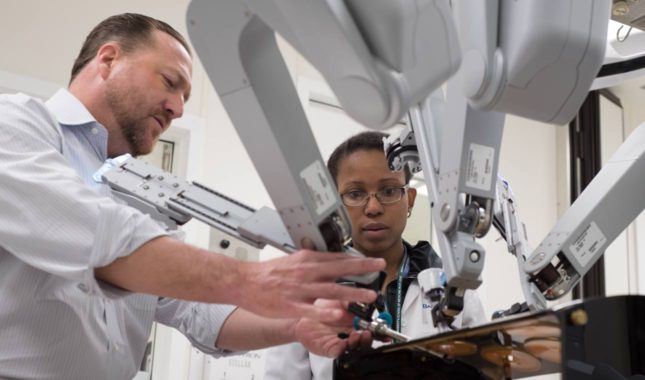The following offices and facilities provide teaching and classroom support:

Bernard Becker Medical Library
The Becker Medical Library’s collection of Medical Education Resources provides medical education faculty and staff a wealth of resources, including online access to scholarly journals, eBooks, databases and scientific images.
In addition, Becker librarians can assist with database searches, partner with you on systematic reviews, and offer medical curriculum support by providing “information seeking skills” feedback for small student group sessions.
Go to Becker Medical Library website »
Bulletin of the School of Medicine
The Bulletin is the catalog of programs, degree requirements, courses that may be offered and course descriptions, pertinent university policies, and faculty for students earning a degree at Washington University in St. Louis.
Collaboration for Interprofessional Education
To further the goal of improving patient safety and quality in health care, three institutions – Goldfarb School of Nursing at Barnes-Jewish College, University of Health Sciences and Pharmacy in St. Louis, and WashU Medicine – have created the Collaboration for Interprofessional Education (CIPE) at Washington University Medical Center.
CIPE connects existing resources among the three institutions, creates a community for like-minded educators, removes barriers to teaching and learning together, and provides the infrastructure to create and evaluate innovative learning activities.
Center for Teaching & Learning
The Center for Teaching and Learning (CTL) champions excellence in teaching to support student learning.
Go to Center for Teaching & Learning website »
Office of Diversity, Equity & Inclusion
The Office of Diversity, Equity & Inclusion provide opportunities for faculty, staff and students to participate in activities and programs focused on diversity and inclusion. Activities include group-based trainings for departments, programs and business units; new employee orientation; new manager orientation; and other training modules including communication across cultures, generations in the workplace, cultural awareness, “isms,” unconscious bias and disability in the workplace. Please contact the office for additional information, or complete the training request form.
Go to Diversity, Equity & Inclusion website »
Educational Technology & Innovation Unit
The Educational Technology & Innovation Unit (ETIU) serves the Office of Education in the design, development, and implementation on educational technology tools, products and services to support the delivery of WashU Medicine degree programs. The Unit is comprised of two sub-units that provide teaching services and technology support:
Instructional Design Studio (IDS): Supports innovation and implementation of best practices in health professions education by partnering with faculty in the design and production of instructional materials and digital resources
Educational Technology Infrastructure & Services (ETIS): System administration and support for defined platforms and schools within ETIU and primary liaison to WUIT, vendors and Canvas partners in educational technology
Office of Faculty Promotions & Career Development
The Office of Faculty Promotions and Career Development oversees faculty review and promotions and support career development, mentoring, communication, faculty policy changes, gender equity and diversity. The office is committed to creating and supporting an environment in which faculty members flourish and achieve their career goals and full professional potential.
Go to the Office of Faculty Promotions & Career Development website »
Farrell Learning and Teaching Center (FLTC)
The Farrell Learning and Teaching Center (FLTC) is the primary location for the MD and DBBS educational programs. Classrooms may be reserved for small group sessions, lectures, meetings and study groups. A typical room includes ample whiteboards, as well as a PC connected to a projector. Auditorium space is also available.
The FLTC offers several social gathering and study spaces, including the Farrell Café, which provides a friendly and welcoming environment for all members of the Washington University community. Artwork is displayed throughout the center to cultivate an inviting and creative atmosphere.
Human Resources
The WashU human resources office helps empower and support university employees. Whether you are researching your benefits, reviewing your pay stub, looking to advance your career, wanting to learn a new skill, planning retirement or exploring options to improve your personal well-being, HR can connect you to valuable resources to help you succeed at the university and live your best life, both professionally and personally.
Office of Medical Student Education (OMSE)
The mission of the Office of Medical Student Education (OMSE) is to cultivate the best environment in which medical education and instruction can flourish.
Simulation Centers
The Howard and Joyce Wood Simulation Center is used for experiential medical education, allowing Washington University medical students, interns and residents to learn skills in a low stress, high-fidelity environment before encountering patients in the clinic and hospital. The center comprises four simulation suites, each with a high-fidelity simulator, and a task training room. Simulation staff are available to help plan and implement simulation and procedural training sessions.
Syllabus Resources
Syllabus resources for faculty teaching WashU Medicine courses including a checklist, policies, and template.